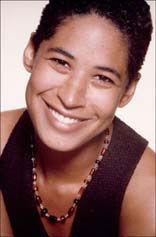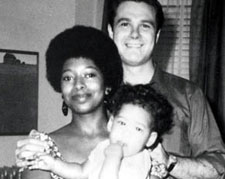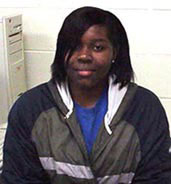Major Works
- Ade: A Love Story (2015)
- MS. Magazine editor
- Black Cool: One Thousand Streams of Blackness, editor ( 2012)
- One Big,Happy Family, editor (2010)
- Baby Love: Choosing Motherhood After A Lifetime of Ambivalence, memoir (2004)
- Black White Jewish: Autobiography of A Shifting Self, memoir (2001)
- To Be Real: Telling the Truth and Changing the Face of Feminism (editor) (1995)
Rebecca Walker: A Biography
by Candace Hunt (SHS) 2002, Updated 2015
Rebecca Walker was born in Jackson, Mississippi, in 1969. She is the daughter of Mel Leventhal and Alice Walker. Her father is white and Jewish and a lawyer who was active in the Civil Rights movement in Mississippi. Her mother is the well-known African American writer of The Color Purple and many other books. Leventhal and Alice Walker married during the Civil Rights movement, and Rebecca was born shortly thereafter. As Rebecca grew older, she began to question her identity. People thought of Rebecca Walker as a movement child. It wasn’t until later in life that she discovered that she was more than that. Today she is a feminist who believes that everything that she has been through, as well as the people she has met throughout her life, made her into the person that she is today. Like her mother, she is also an author.
While Rebecca Walker was very young, her parents began to have problems in their marriage. When she was eight years old, her parents told her they were getting a divorce. The divorce changed her life. She was forced to live two years with her mother and the next two with her father. She has lived in Mississippi, New York, Washington, and suburban Westchester. Moving all over the country was very hard on her, and she had a hard time fitting in. She was always excluded because she was biracial. Blacks considered her to be white, but whites thought that she was black. Loneliness and confusion forced her to turn to sex, drugs, and the wrong crowd. She became pregnant around the age of fourteen, but she decided to have an abortion.
By the time she reached twelfth grade, she had grown as a person. She was doing great in school and was the president of her class. Her look at life changed, and she decided to change her last name to Walker. She wanted a chance to learn more about her black side, a move which brought her closer to her mother. To Rebecca, the name change symbolized “living in the world of non-white skin.” It also had a lot to do with not being accepted by most of the relatives on her father’s side of the family, including her father’s parents, who disowned him because he married a black woman. Racism has been a big part of Walker’s past, and she relates stories of many different types of discrimination through her writing.
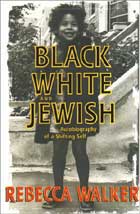 Rebecca Walker is the editor of To Be Real: Telling The Truth and Changing the Face of Feminism, published in 1995. It is about the triumph of women trying to discover feminism and has even become a standardized textbook for female study courses all over the country and Canada. Her second book is a memoir, Black, White, And Jewish Autobiography of a Shifting Self, which tells about her life struggle to find herself and to fight discrimination. She is also an editor for Ms. Magazine, for which she has been writing since 1989. Many of her articles have been published in Mademoiselle, Essence, The New York Daily News, Spin, and The Black Scholar, a magazine for which Robert Allen, Alice Walker’s current husband, is an editor. Reproductive freedom, sexuality, and domestic violence are discussed in many of her articles. Her writing has appeared in Glamour, The Washington Post, Bookforum, BOMB, Newsweek, Vibe, Real Simple, Modern Bride, Essence, Interview. She has appeared on Charlie Rose, Good Morning America, Oprah, Fresh Air, BET, and other media forms of media. Her first novel, Adé: A Love Story, was published in 2013.
Rebecca Walker is the editor of To Be Real: Telling The Truth and Changing the Face of Feminism, published in 1995. It is about the triumph of women trying to discover feminism and has even become a standardized textbook for female study courses all over the country and Canada. Her second book is a memoir, Black, White, And Jewish Autobiography of a Shifting Self, which tells about her life struggle to find herself and to fight discrimination. She is also an editor for Ms. Magazine, for which she has been writing since 1989. Many of her articles have been published in Mademoiselle, Essence, The New York Daily News, Spin, and The Black Scholar, a magazine for which Robert Allen, Alice Walker’s current husband, is an editor. Reproductive freedom, sexuality, and domestic violence are discussed in many of her articles. Her writing has appeared in Glamour, The Washington Post, Bookforum, BOMB, Newsweek, Vibe, Real Simple, Modern Bride, Essence, Interview. She has appeared on Charlie Rose, Good Morning America, Oprah, Fresh Air, BET, and other media forms of media. Her first novel, Adé: A Love Story, was published in 2013.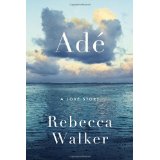
After completing high school, Rebecca Walker went to Yale, from which she graduated cum laude in 1992. Following graduation, she became co-founder of the Third Wave Direct Action Corporation., a national nonprofit organization that initiated an historic emergency youth drive, which registered over 20,000 new voters in inner cities across the United States. She has given a lot to the community. The nonprofit organization focuses on the leadership and active quality of young women. Rebecca Walker has received a lot of recognition for her tributes to society. She has hosted a television forum on inner city teen violence, pregnancy, and drug abuse. She has received the Feminist of the Year Award from the Fund for the Feminist Majority and the Champion of Choice Award from the California Abortion Rights League. The Paz Y Justicia Award was also given to her by the Vanguard Foundation. Walker is raising a child with her partner, singer Meshell N’degeOcello. She is lives in California.
She is currently working on two new books: Putting Down the Gun: New Masculinity, about men who are finding new ways of being a man that are not based in violence and emotional repression, and another memoir which is perhaps the next chapter of Black White and Jewish.
Today Rebecca Walker is co-founder of the Third Wave Foundation, a non-profit that works through grant-making, leadership development, and philanthropic advocacy to support young women of all backgrounds, ages fifteen to thirty, working towards gender, racial, economic, and social justice. She is a speaker, manuscript consultant, workshop facilitator, editor, and award-winning author.Time Magazine named her one of the” fifty most influential leaders of her generation. As a public intellectual, she is known for presenting ideas about race, class, culture, gender, and the evolution of the human family that challenge ideological rigidity.”
The recipient of the Women Who Could Be President Award from the League of Women Voters, she has also received The Woman of Distinction Award from the American Association of University Women, The Intrepid Award from NOW, and an Honorary Doctorate from the North Carolina School of the Arts. Rebecca also sits on the boards of the environmental organization Save the Bay, and Children As They Are, a project of GenderPac.
At the age of thirty-seven, she decided to have a child. Her book Baby Love: Choosing Motherhood After A Lifetime of Ambivalence is a memoir of her experience. It was published in 2007 and is the story of her physical and emotional journey toward motherhood, and the ambivalence that delayed her dream of having a child for years. Walker currently lives with her son Tenzin and his father Glen on Maui, Hawaii.
She is now estranged from her famous mother, Alice Walker. A article written by Rebecca about her estrangement can be found online here entitled How my Mother’s Fanatical Views Tore Us Apart. It was written in 2008.
In addition to writing and editing books, Walker develops film and television projects and teaches the Art of Memoir at various locations.
Reviews
A Review of Black, White, and Jewish: Autobiography of a Shifting Self
by Candace Hunt (SHS) 2002
Black White and Jewish Autobiography of a Shifting Self is one of the best books that I have ever read. It relates to and discusses discrimination, sexuality, and self-identity. The author is so sentimental; it is as if the reader feels the words. I feel as if I have known her my entire life. One of the best things about this book is that it is very detailed. It follows the special moments in life that many of us don’t remember. Some of the things that have happened in her life will shock and surprise the readers. The memoir gives readers a chance to take a look into what it is like to grow up black, white, and Jewish in a world divided by discrimination. Rebecca Walker not only experienced racism in the community, but she also comes in contact with it in her own family. I recommend it to everyone.
As a word of caution, there is some sexual content, bad language, and a small portion of violence, but I loved the book.
E-mail Interview with Rebecca Walker (July 27, 2002)
by Candace Hunt (SHS)
What inspired you to become a writer?
I have always been a reader. Books were my friends as a child and as I got older I found that I wanted to tell my story and meet other people through words in the same way. It helped that both of my parents are writers, so writing was the sanctioned form of communication in my household. My parents used to write me notes as a child and I would write them back. I guess I have always been a writer.
Who is your favorite author?
I have so many, that question is almost impossible to answer. From Toni Morrison, Zora Neale Hurston and Jamaica Kincaid, to William Faulkner, Thomas Hardy and Franz Kafka, my reading is varied and eclectic. I also love poets: Pablo Neruda, Sharon Olds, June Jordan, Thich Nat Han. I could go on and on.
How long did it take you to write Black, White, and Jewish?
It took three and a half years to write BWJ, mostly because it was so cathartic and intense. I had to do a lot of psychological soul searching in order to sit down and tell my story. I also had to work through my fear that my parents would be upset with me for telling it.
Are you currently working on a new book? What is the title and subject?
I am working on two new books, one is an anthology I am editing right now called Putting Down the Gun: New Masculinity, about men who are finding new ways of being a man that are not based in violence and emotional repression. The second book is I think the next chapter of Black White and Jewish!
Why did you decide to have an abortion?
I was so young when I became pregnant, there was no way I could have cared for a child and I did not think it was fair to bring a being into the planet under those conditions. I also did not want to sacrifice my own life. I had a very strong feeling that I was meant to do other things.
How has Mississippi influenced your writing?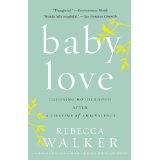
I feel that the South is in me in a lot of ways that are hard to describe. It is in my blood, the way I move my body and choose my words. I feel very at home in the South and I think that has a lot to do with being born in Mississippi and spending my early years there in the embrace of some very loving and sweet people. There is a warmth, an openness that I connect with my African-American relatives and ancestors in the South, that means a great deal to me. I also draw on the tradition of Southern Writers: Flannery O’Connor, Faulkner, of course my mother, Alice Walker. It feels good to have that shared link to that earth, that Southern history.
Has changing your name brought you and your mother closer?
Yes. I think changing my name meant a great deal to my mother. It hurt my father but my mother felt it was the just thing to do. It is important, especially when the parents are divorced, I think, for children to have a visible link to both parents, the mother in particular as she s often the one doing the majority of the child rearing. In our patriarchal culture that is always trying to render the mother invisible and even unnecessary (look at cloning!), it is even more important to claim the mother publicly.
Did your parents support your decision to become a writer?
I wouldn’t say my parents supported my decision to become a writer, but they certainly supported my decision to become whatever it is that makes me happy. They sent me to good schools and college, and were there for me in so many different ways, emotionally and psychologically, along the way. While I never felt they were the biggest fans of my writing, I did feel that they had tremendous faith and pride in me, and that has definitely affected my work.
Thank you! Good Luck and do let me know when the site is complete. I have attached a picture of my family for you to use.
Rebecca Walker
Related Websites
- Rebecca Walker’s own web site provides information about her and her books.
- Washington Post article about the estrangement of Rebecca Walker and her famous mother Alice Walker.
- OBERLIN University has Rebecca Walker talk to the students.
- Walker speaks at Emory University.
Bibliography
- Author Profile: Rebecca Walker.
- Keppler Associates Inc. Online: Rebecca Walker Speaks.
- Keynote Speaker: Rebecca Walker at college conference.
- Translating Between Two Worlds: An Interview with Rebecca Walker by Judith Bolton-Fasman
- Interview by 3 the sea of IVillage with Rebecca Walker

